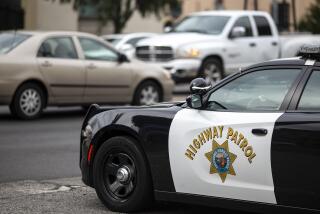Railroad Employee Wins $485,000 in Southern Pacific Drug-Test Case
- Share via
SAN FRANCISCO — In the largest award of its kind, a jury here Friday awarded a computer programmer more than $485,000 because she was fired by Southern Pacific Railroad for refusing to submit to a random drug test.
The ruling was immediately hailed by foes of drug testing as a blow against widespread, random testing of workers. It was also the first major decision in a drug-testing case against a private company in California.
The jury found that Southern Pacific violated both public policy and the privacy of Barbara Luck, 37, with its 1985 drug-testing program. In that program Luck and 485 other employees were required to provide urine samples. Unlike her co-workers, Luck refused to take the test, was suspended and then fired.
Superior Court Judge Maxine M. Chesney ruled earlier in the week that random drug testing of employees who had safety-related jobs, like railroad engineers, is legal, but left for jurors to decide whether the policy was properly applied to Luck.
After deliberating less than a day, the jury ruled against Southern Pacific. An attorney for Southern Pacific indicated that the company will appeal. An appellate court ruling on the issue would have even broader application in the workplace.
While few companies have programs as broad as Southern Pacific’s, the case was closely watched by supporters and opponents of drug testing. As many as 50% of the major companies in the nation use some form of drug screening on employees or prospective employees. Some firms have delayed enforcement of random testing pending the results of the Luck case and others like it.
Corporate Jitters
“That was what we were afraid of. We weren’t sure of the legal rights of the employees,” said George Sarkisian, spokesman for Pacific Gas & Electric Co., which tests job applicants as a condition of employment.
The ruling is not likely to affect tests of applicants, the most common form of drug testing.
Luck’s attorneys, Mark S. Rudy and Kathleen Lucas-Wallace, said the verdict, though not officially precedent-setting, will send a message to employers that companies cannot legally apply random tests to all employees. They said it will encourage policies that ensure confidentiality, let workers know the consequences of refusing the tests and apply only to employees whose jobs affect public safety.
“If you’re going to be driving a train, that’s different from a computer programmer,” Lucas-Wallace said.
Luck had worked for the company for six years, and was two months pregnant when she refused the test, although her pregnancy was not the reason she gave for refusing.
“Companies have to consider your rights; they are not free to ask you to do offending, degrading things,” Luck said after the verdict. “. . . I think it’s your responsibility to not let people abuse you.”
‘There Is a Need’
The jury awarded Luck $180,092 in economic damages for the firing itself, $32,100 for pain and suffering, and $272,850 in punitive damages for a total of $485,042. The eight-woman, four-man jury was unanimous on all points, except for the amount of punitive damages. Two jurors said they wanted to award Luck $500,000 in punitive damages, rather than the $272,850.
The crucial issue was whether she was involved in safety-related work, but that was quickly resolved, jury foreman Neil O’Brien said. The bulk of the time was spent on determining damages, he said. After they reached the verdict jurors spoke of the landmark nature of the case, he said.
O’Brien said “there is a need” for drug testing in safety-related jobs. “But what we were talking about was the application (in Luck’s case),” he said.
“It certainly means that Southern Pacific is going to have to reconsider its testing policy,” an unhappy Southern Pacific attorney Robert Bogason said afterwards, adding that he expected to appeal the case.
He said the jury “took the right to privacy too far,” and maintained that the company, which still randomly tests employees outside of San Francisco, believed that it was correct in instituting the program as a way of protecting public safety.
“We don’t think we should be punished for that. . . . Maybe we were wrong. But we thought we were doing the right thing,” Bogason said, adding that he believes the drug testing has reduced accidents.
More Such Verdicts Seen
Foes of drug testing hailed the verdict, and several predicted that it will be the first of many judgments against companies that randomly test.
More to Read
Inside the business of entertainment
The Wide Shot brings you news, analysis and insights on everything from streaming wars to production — and what it all means for the future.
You may occasionally receive promotional content from the Los Angeles Times.










